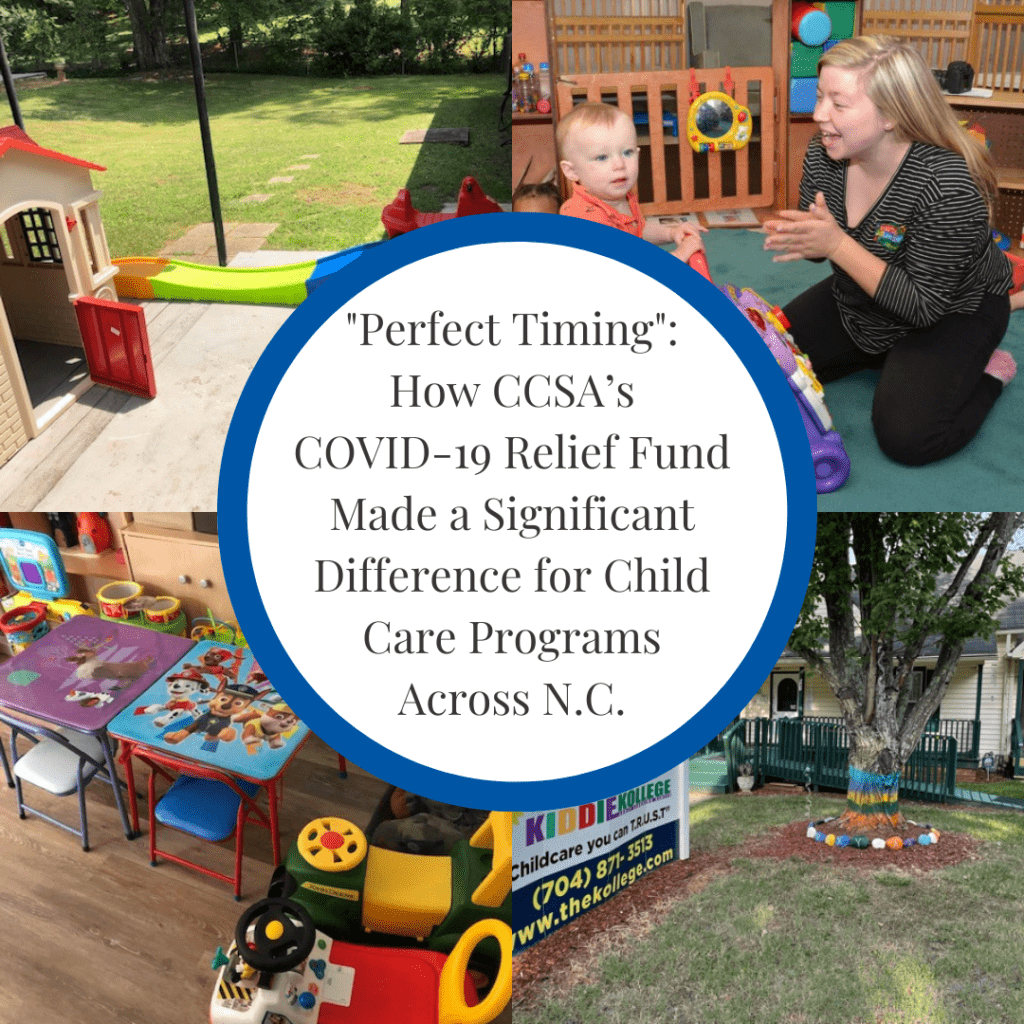“Perfect Timing”: How CCSA’s COVID-19 Relief Fund Made a Significant Difference for Child Care Programs Across N.C.
Awarded child care programs share the impact of the grant first-hand
“…The timing [of the CCSA COVID-19 Relief Fund] was perfect. It came at a point in time where there was a lot of uncertainty and a lot of demand for us to stay open, but we didn’t know what that was supposed to look like and we weren’t getting a lot of guidance.”
— Jamie Lipps, director of Kiddie Kollege Early Learning Center in Iredell County, N.C.
When North Carolina Governor Roy Cooper issued a stay-at-home order in response to rising COVID-19 cases in early 2020, child care programs across the state faced a tough decision: temporarily close their doors or risk their health and finances to care for the children of essential workers. With enrollment numbers at an all-time low, many of those programs that chose to remain open struggled to make ends meet or to keep their staff supported.

In March 2020, Child Care Services Association (CCSA) partnered with Smart Start to create the CCSA COVID-19 Relief Fund in an attempt to mitigate the catastrophic impact of the pandemic on child care programs across North Carolina. In Phase I of the Relief Fund, small grants were distributed to programs that remained open during the statewide shutdown. As the pandemic showed few signs of slowing down, CCSA recognized a need remained to fund the necessary changes programs would have to make to stay open and keep their staff and children safe. After an extensive application and review process, 41 child care programs across the state were awarded large grants from Phase II of the CCSA COVID-19 Relief Fund.
Now, almost a year after Phase II funding was issued and many COVID-19 restrictions have been lifted throughout North Carolina, we checked in with some of the funded programs to see how they were doing.
Kiddie Kollege Early Learning Center: “…it forced me to sit down and think, ‘what are some things we really need to help us through this process?’”
Kiddie Kollege Early Learning Center (ELC) is a five-star center in Iredell County working to provide high-quality early education to children with the philosophy that “every moment is a teachable one.” Jamie Lipps, director of Kiddie Kollege ELC, had a unique approach for use of the relief funding.
“We used the grant funds to purchase tablets and headphones for the kids,” Jamie reported, “because our biggest concern with our kids is that we have a lot of kids from lower socioeconomic backgrounds. We knew that remote learning was going to be a huge piece for our NC Pre-K kids. You know, we kind of blindly said ‘yeah, everything’s going to be online,’ but then no one really thought about how some of these kids were actually going to be able to access the internet and everything.”
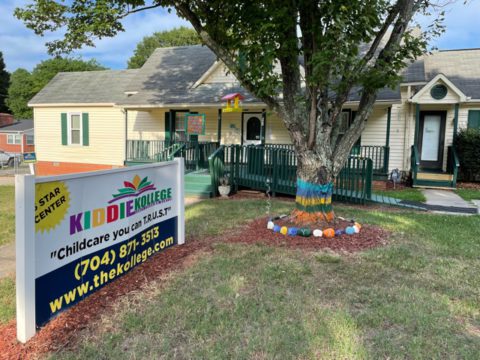
CCSA’s COVID-19 Relief Fund provided her center with the money she needed to provide for all of the children enrolled at Kiddie Kollege ELC. “Because all of them have [tablets and headphones],” Jamie said. “That actually takes care of both of my Pre-K classrooms and my three-year-old classroom that will be rising NC Pre-K…It actually allowed me to start introducing them [three-year-olds] into [remote learning] as well.”
The decision to purchase tablets and headphones has benefited the program in ways far beyond what Jamie initially expected. She told us the tablets have helped the children and their families even outside of the classroom. On teacher workdays, holiday breaks and during this summer, children in the program can check out tablets even when they are not in class.
She shared, “We sent families home with summer packages of activities and things to do where they can use their tablets. So, yeah, [the tablets] have definitely changed a lot of what we do and how we do things at Kiddie Kollege…I’m very thankful for getting those.”
When discussing her decision to spend the grant money on tablets and headphones for remote learning, Jamie said, “When the grant came available, it forced me to sit down and think, ‘what are some things we really need to help us through this process?’…I want[ed] to use [the grant funds] for something that will really outlast this pandemic and enhance our center…We all just sat around and brainstormed about it, and we said, ‘the tablets, let’s do that’…I’m just eternally grateful for it.”
Jamie used what was left of the funding to continue upholding high standards of care and support her staff during this difficult time. “That money that I would’ve spent for getting the tablets and things I wanted for the kids, I didn’t have to spend that. I was able to put that back into the center and redirect those funds in another way,” she told CCSA.
Additionally, Jamie was able to host a teacher appreciation lunch early last summer, which she said her staff “absolutely loved.” “For them, it’s really huge when we do things like that,” she shared.
Shining Stars: “They’re considered essential workers and they’re all single parents.”
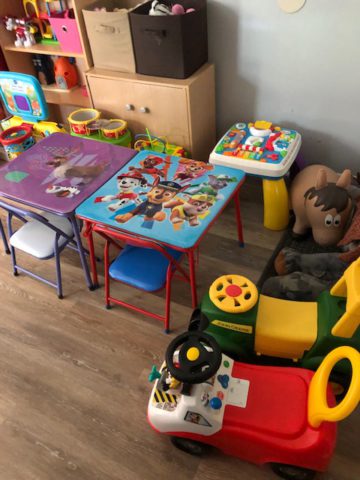
Shining Stars is a licensed family child care home in Hickory, North Carolina. Open since 2006, 100 percent of the children at Shining Stars come from single-parent homes where the parent is considered an essential worker. Jennifer Sonnek, owner and operator of Shining Stars, applied for CCSA’s COVID-19 Relief Fund to better serve the families enrolled, all of who faced a unique set of challenges as essential workers during the COVID-19 pandemic. Because of the vast age range of children served and the chaotic schedules of their hardworking parents, Jennifer needed to provide important resources for a variety of ages. This included computers, internet access and school supplies for remote learning, as well as opportunities for physical exercise, toddler-safe toys and equipment, supplies to provide proper nutrition and more.
Jennifer spoke on the importance of the role she plays in the lives of these children and how receiving the grant funds helped her to better fulfill that role. “Every one of the parents of my kids have worked throughout COVID, so they’re considered essential workers and they’re all single parents. So they rely on the vouchers for payment. You know, they [the children] are with me honestly more than they are at home.”
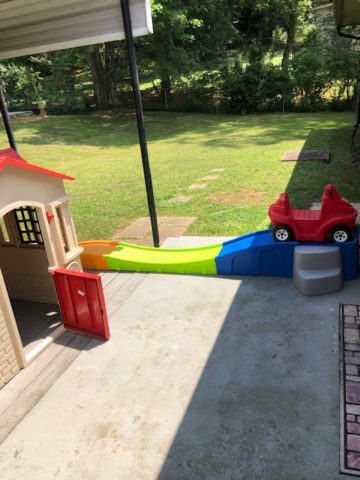
She also shared the positive impact receiving the relief funding had on the children. “The kids, just seeing their faces, they were really excited. Especially seeing the basketball goal outside and then the little playhouse that I got and this little rollercoaster type thing they can sit on and ride. They were really excited to see all that. And I mean, they still are, we still play with all of that, of course, now.”
Because of CCSA’s COVID-19 Relief Fund grant, Jennifer was able to make a real difference in the lives of the children she serves and relieve some pressure from their parents, all frontline workers during the pandemic. “Having the extra things here that I needed, and getting the kids’ homework done here really helped the parents out a lot…Just having everything done, so when they get home, they can just hang out with their child, give them a bath [and] eat dinner,” she said.
Partners in Learning: “There was no stress, they were paid for all of that time.”

Partners in Learning is a nonprofit community impact organization that currently operates two child care centers and various family support services in Rowan County. Partners in Learning applied for a grant from CCSA’s COVID-19 Relief Fund because the program was struggling to cover the cost of paying staff and substitute teachers when staff had to be absent due to COVID-19, whether awaiting test results or quarantining based on potential exposure.
Executive Director Norma Honeycutt shared the impact CCSA’s COVID-19 Relief Fund had on her organization. “We’re [now] at full capacity with a waiting list of over 300…We have been able to retain the majority of our staff members…And I think a lot of that success has to do with being able to pay them while they have to be out with their families, with their children, with their parents…There was no stress, they were paid for all of that time.”
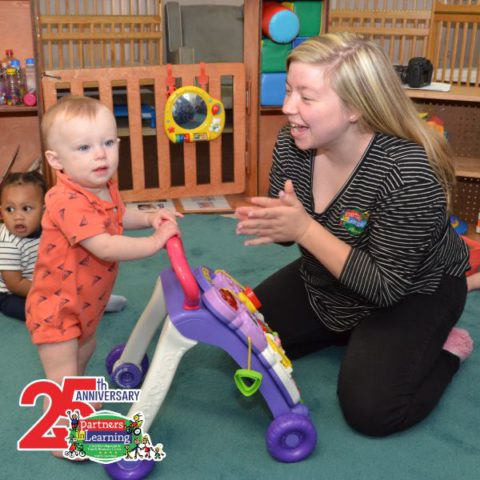
It was not just the staff who benefited from the grant funds. “Even though the grant was used to pay for staff relief,” Norma said, “had we not had these funds, we would have had to use other funds from somewhere within our budget.” Because Partners in Learning did not have to pull money from other areas of their budget, the program could continue providing high-quality care to the children enrolled.
Speaking on the importance of keeping qualified staff to support the children during this tough time, Norma told us she believes she made the right decision to use the funds to continue paying her staff and substitutes. “Having these funds has given our staff a peace of mind during these times,” Norma said. “This has also built the staff morale; the staff want to stay here and work and they are not looking for alternative work. This provides the children with consistency and teachers that are invested in their learning. The teachers are committed and are planted in the center because they know that they will be taken care of.”
The Early Education Crisis: The Workforce Shortage and Fight for #WorthyWagesNC
Norma knows that retaining the majority of the staff at Partners in Learning through the pandemic has been a major asset for the program, as she and other providers are painfully aware of the shortage of high-quality early educators in the field.
Jamie Lipps shared a related sentiment, telling us the most challenging thing Kiddie Kollege ELC faces right now is the low availability of high-quality teachers. When asked what she believes could be contributing to the shortage, Jamie said, “Our margins and our ability to pay just isn’t there…[I would] have to shut my doors if I tried to offer benefits…I try to do the best that I can to be competitive with salaries, but it’s very difficult.” Jamie elaborated, “What is also contributing to the shortage of teachers is…other fields and their bonuses and the amount of money that they [pay] is taking some of our workers from child care to different industries.”
The combination of extreme under-compensation and a general underappreciation for those working in the early education and child care fields is driving much of the workforce to leave the field in search of higher salaries and better benefits.
This crisis is what inspired CCSA to partner with the North Carolina Early Childhood Coalition to launch the Worthy Wages NC campaign in April of this year. Fighting to raise awareness for the under-compensation and underappreciation of North Carolina’s early educators, the campaign is designed to promote action on behalf of the public in hopes of influencing the state’s legislature to publicly invest in early childhood education with American Rescue Plan Act (ARPA) funds. It’s Long Past Time Early Childhood Teachers Earned a Worthy Wage. Learn more about the fight for #WorthyWagesNC.
On behalf of CCSA and all the child care programs across the state, we offer our most sincere gratitude to Blue Cross and Blue Shield of North Carolina Foundation, PNC Foundation, Truist Charitable Fund, ChildTrust Foundation and other private donors of the CCSA COVID-19 Relief Fund, Smart Start and everyone who played a part in this effort to support child care in North Carolina during these challenging times.
